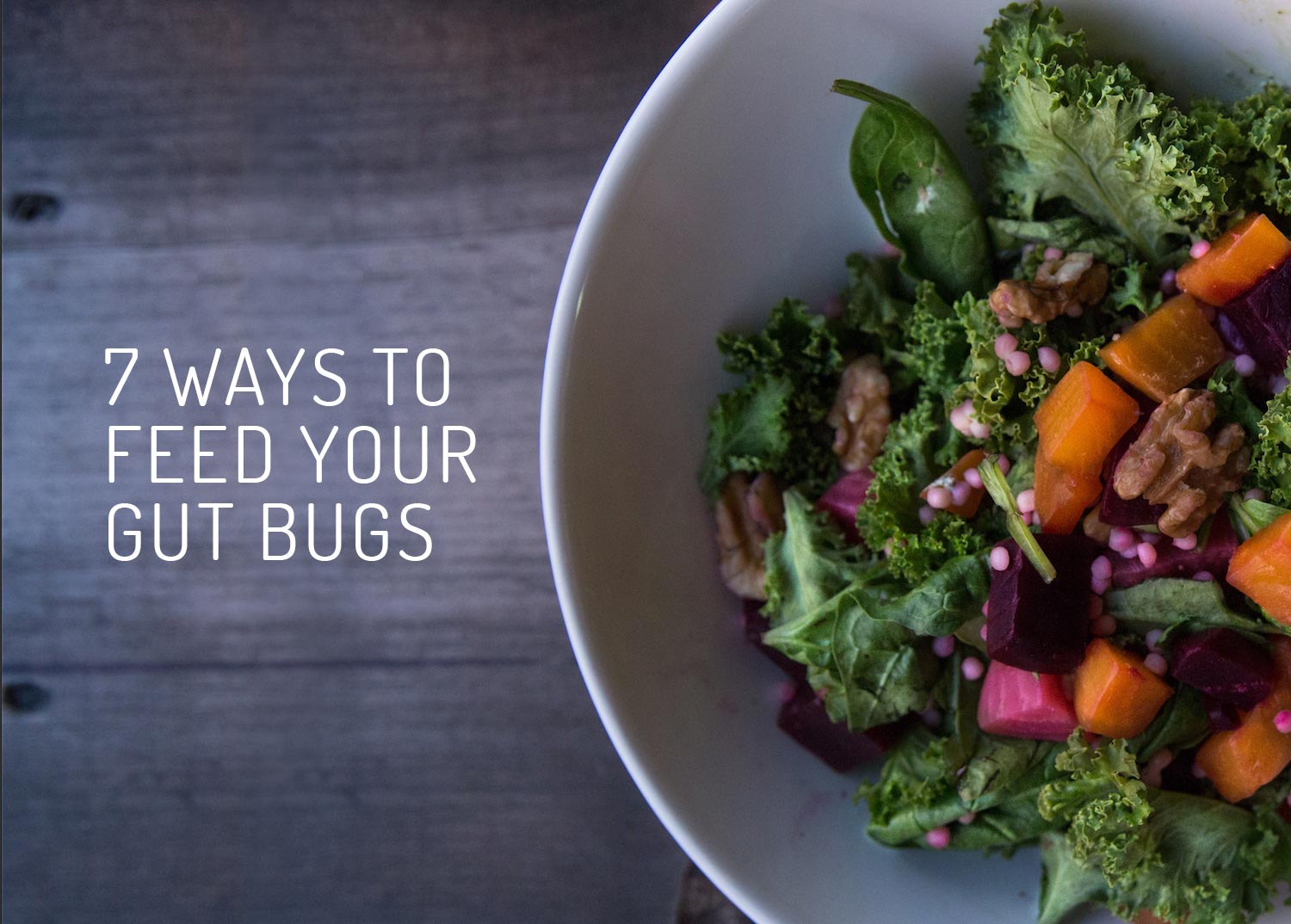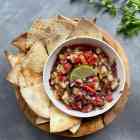Your Gut Bugs, What They Eat and 7 Ways to Feed Them

You've certainly heard the news about how important your gut microbes are, right?
And they (all the trillions of them that live inside you) really are! Research is ongoing, but these helpful intestinal microorganisms (or gut bugs, as we lovingly like to call them) have been linked to reduced levels of inflammation as well as “brainy” impacts on mood and behaviour, just to name a few.
Your gastrointestinal system and brain communicate directly through the “microbiota-gut-brain axis” which includes gut bugs talking to the central nervous system (including the brain).
And when it comes to neuroscience, we're not just talking brains here. Yes, your gastrointestinal system and brain communicate directly through the “microbiota-gut-brain axis” which includes gut bugs talking to the central nervous system (including the brain) via a special nerve called the vagus nerve. In addition to this, the gut has its very own nervous system called the “enteric nervous system”. Dr. Keith Sharkey, one of our Science Council members and Deputy Director of the Hotchkiss Brain Institute at the University of Calgary, loves this stuff so for more on this particular topic check out some of his work, here.
In a nutshell, all these hundreds of species of microbes living in your gut are called the “microbiome,” and they are sometimes referred to simply as “probiotics” (pro=helpful, bio=alive). They're alive inside you; and they're helpful.
Probiotic live bacteria need food too. We refer to the food for your probiotics as prebiotics.
And guess what? These probiotic live bacteria need food too. We refer to the food for your probiotics as prebiotics. (I know, scientists are just so creative in their naming, right?)
So, what you eat feeds your gut bugs. And we include both probiotics AND prebiotics in our NeuroTrition Rx for brain and mental health.
Lots of things can influence the health of your gut microbiota; these include your genes, gastrointestinal infections, medication use, and much more. But today we're going to focus on how your food choices can influence your gut microbiota and gut-brain axis. In other words, how should you feed your gut bacteria for maximal neuro-health?
PREBIOTICS AND NEURO-HEALTH
Researchers are now beginning to understand some of the ways your microbiome has these great effects on our health and neuro-health.
One of these ways is that a good gut microbiome can help you to absorb and digest more nutrients. Gut bugs help to control how fast food moves through your gut, they play a role in secretion of key digestion components like stomach acid, as well as lowering the pH of the colon which can help increase absorption of minerals like calcium (and calcium is critical for transmission of nerve signals). Not to mention that these microbes make some nutrients themselves (certain vitamins and short-chain fatty acids, for example), which wouldn't be possible if you weren't feeding them right.
A link has also been shown between a change in the gut microbiota, and its impact on moods and even some mental health imbalances like anxiety and depression.
A link has also been shown between a change in the gut microbiota, and its impact on moods and even some mental health imbalances like anxiety and depression. Scientists have also found that the gut microbiota actually signal to neurons (yes, these gut bugs talk to our neurons!) via neurotransmitters and hormones. Not to mention, there are additional indirect positive brain impacts from gut bugs because they play a role in reducing inflammation and stabilizing blood sugars, both of which are key for brain health.
We have a “symbiotic” relationship with our gut microbes, in that if we help them (by feeding them what they need), they in turn help us.
WHAT FOODS HAVE PREBIOTICS?
There are three criteria a food must meet to be called a “prebiotic”:
- It would need to go through most of your gastrointestinal system, reaching your colon intact;
- It would be fermented by those intestinal microbes; and finally,
- It would stimulate the “good” microbes associated with health.
The more of these prebiotics we eat, the more healthy probiotics will grow in our gastrointestinal system. This is known as the “prebiotic effect” and it can be used to increase the number of “good” microbes, and decrease the activity of the “bad” ones. One way this happens is that the microbes eat the prebiotics and produce short chain fatty acids that slightly acidify the colon, and can lead to a reduction in the growth of some of the “bad” microbes.
The main foods that your microbiota really like to eat are carbohydrates, mostly in the forms of special fibre and resistant starch.
The main foods that your microbiota really like to eat are carbohydrates, mostly in the forms of special fibre and resistant starch (a type of starch that is thought to help you get thinner, healthier, and even smarter because it is not digested in the stomach or small intestine and reaches the colon intact, thus being “resistant” to digestion). Microbes use anaerobic (oxygen-free) fermentation to break these prebiotics down. Fibre and resistant starch are found mostly in plant foods, like vegetables, fruit, and legumes.
Some of our NeuroTeam's and Science Council's favourite brain foods are full of prebiotic fibre (and are amazingly delicious too). Foods like vegetables (kale & sweet potatoes), fruit (blueberries), nuts and seeds (walnuts & hemp seeds), and even cacao are on our list. Plus many more!
We already know that eating a lot of these foods is great for your health on so many levels; but did you consider that one of those levels may also include the fact that you're feeding your friendly gut microbes their favourite food too?
7 EASY WAYS TO FEED YOUR GUT BUGS (AND YOUR BRAIN HEALTH)
- Why not throw some roasted sweet potato on to your kale salad? What about topping that with a healthy dressing and a sprinkle of hemp seeds?
- Want even more ways to get some sweet potato onto your plate? Here you go.
- How about this salmon and quinoa dinner with kale? Recipe.
- Add berries wherever you can. And they don't have to be fresh – try frozen ones. Add them to your yogurt, chia pudding, throw them on a salad, or just eat a handful plain.
- When's the last time you indulged in some dark chocolate (70% or higher)? Better yet, enjoy it with a few walnuts.
- Have you tried our brain-boosting hot cocoa made with raw cacao powder? You're welcome. Recipe.
- What about our avocado superfood pudding with blueberries? Recipe.
We’ve been telling our clients to include a probiotic rich food at every meal for years. Now we’re recommending that they add a prebiotic food as well, so the probiotic can work even better! So, for example, think plain Greek yogurt plus some raw cacao nibs to make the probiotics in the yogurt work better. Pretty brainy (not to mention tasty), right?
- References
-
- Aizawa, E., Tsuji, H., Asahara, T., Takahashi, T., Teraishi, T., Yoshida, S., Ota, M., Koga, N., Hattori, K. & Kunugi, H. (2016). Possible association of Bifidobacterium and Lactobacillus in the gut microbiota of patients with major depressive disorder. J Affect Disord, 202:254-7.
- Bercik, P., Collins, S.M. & Verdu, E.F. (2012). Microbes and the gut-brain axis. Neurogastroenterol Motil, 24(5):405-13.
- Riccio P. & Rossano R2. Nutrition facts in multiple sclerosis. (2015). ASN Neuro. 7(1).
- Roberfroid, M., Gibson, G.R., Hoyles, L., McCartney, A.L., Rastall, R., Rowland, I., Wolvers, D., Watzl, B., Szajewska, H., Stahl, B., Guarner, F., Respondek, F., Whelan, K., Coxam, V., Davicco, M.J., Léotoing, L., Wittrant, Y., Delzenne, N.M., Cani, P.D., Neyrinck, A.M. & Meheust, A. (2010). Prebiotic effects: metabolic and health benefits. Br J Nutr, 104 Suppl 2:S1-63.
- Savignac, H.M., Couch, Y., Stratford, M., Bannerman, D.M., Tzortzis, G., Anthony, D.C. & Burnet, P.W. (2016). Prebiotic administration normalizes lipopolysaccharide (LPS)-induced anxiety and cortical 5-HT2A receptor and IL1-β levels in male mice. Brain Behav Immun, 52:120-31.
- Sharkey, K.A. & Mawe, G.M. (2014). Neurohormonal signalling in the gastrointestinal tract: new frontiers. J Physiol, 592(14):2923-5.
- Sharkey, K.A. & Savidge, T.C. (2014). Role of enteric neurotransmission in host defense and protection of the gastrointestinal tract. Auton Neurosci, 181:94-106.










